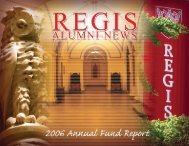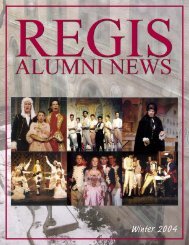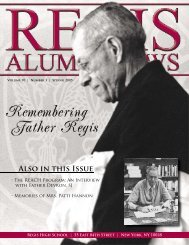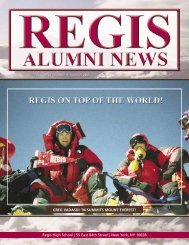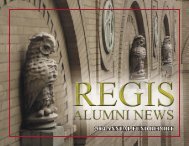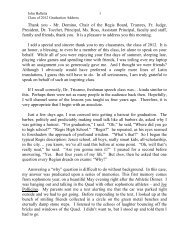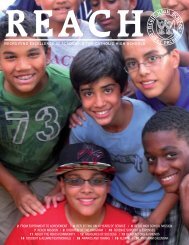REGIS
RAN - Dec 03 FINAL 1-4-04.indd - Regis High School
RAN - Dec 03 FINAL 1-4-04.indd - Regis High School
- No tags were found...
Create successful ePaper yourself
Turn your PDF publications into a flip-book with our unique Google optimized e-Paper software.
Mass of the Holy Spirit & Academic Convocation<br />
Remarks by James P. Kelly ‘71, Editor, TIME Magazine - September 5, 2003<br />
I did not know anybody here, and I was certain no one wanted to know<br />
me. I had a terrible first quarter, flunking Latin and Math; to this day, I<br />
remember my homeroom teacher, Mr. Connelly, giving me a sharp look<br />
of disapproval as he handed me my first report card. I was pretty sure<br />
I would flunk out by the end of my first year, a fate that struck me as<br />
about the most shameful thing that could happen, not only to me but to<br />
my mother, for whom a Regis education was<br />
the next best thing to joining the priesthood. I<br />
was also somehow sure that if I flunked out of<br />
Regis I would not get into a good college and<br />
would be unemployed the rest of my life.<br />
As you can see, I was a fretful teen…<br />
I have no idea how many of you had these<br />
worries when you started here, or have them<br />
today, in fact, since for many of you this is<br />
your first week at Regis. But I bring you great<br />
news: these worries do pass, and you will be a<br />
success, at least as measured by a resume. Being<br />
in such an intimidating place as Regis can<br />
sometimes obscure the fact that you are gifted,<br />
you actually are smarter and more talented<br />
than most people, and that whether you end<br />
up first in your class or last in your class here,<br />
you’ve gotten a better education than most<br />
people get and you have the native intelligence to find out what you want<br />
to do with your life and do it reasonably well. I know I sound like one of<br />
those pitchmen on late night TV who promise to show you how to make<br />
a million dollars in real estate overnight, but I do believe that if all of you<br />
work hard, all of you will do well. After all, you got into Regis.<br />
Now for the more sobering news. Doing well is not the same thing as<br />
doing good, and alas there is no guarantee that any of us will always<br />
do good. And by doing good I mean living a moral life, a life not just<br />
of treating others the way you would like to be treated, but of doing the<br />
right thing, even if it means becoming unpopular or hurting the feelings<br />
of others for a larger cause.<br />
And one reason why I cannot safely predict we all would do the right<br />
thing is that we cannot predict what situation we might suddenly find<br />
ourselves in that requires a moral choice. One of the most important<br />
choices I face each year at TIME is picking the Person of the Year,<br />
and almost always it is a titan of politics or business or world affairs, a<br />
George Bush, a Rudolph Guiliani, a Bill Clinton, a Ted Turner, a Mikhail<br />
Gorbachev. But last year I picked three little known women, Coleen<br />
Rowley of the FBI, Cynthia Cooper of Worldcom, and Sherron Watkins<br />
of Enron. All worked for very big outfits, all were successful, and all<br />
loved their jobs and their immediate co-workers. And all saw something<br />
very wrong going on that led them to blow the whistle, in the process<br />
upending their lives and the lives of their families and co-workers.<br />
In retrospect, of course, it looks like a relatively easy decision for them:<br />
tell your boss something is very wrong, and end up on the cover of TIME<br />
as Whistleblower of the Year, with book contracts and speech fees and<br />
righteous fame. Except that they did not know any of this would happen<br />
when they showed the courage they did, and frankly life has not gone that<br />
well for Coleen Rowley of the FBI, whose fame has not stood her in good<br />
stead in the FBI but has chosen to remain there rather than cashing in.<br />
Jim Kelly ‘71 outside St. Ignatius Loyola<br />
with John Connelly ‘56<br />
You may never be confronted with a case of national security that you<br />
feel is being bungled, as Coleen Rowley did, and you may never face<br />
a case of cooked accounting books, as Cynthia Cooper of Worldcom<br />
did, or a case of executive lying, as Sherron Watkins of Enron did. But I<br />
would be very surprised if you never faced a situation where standing up<br />
for what you believed was right might blemish your resume, or cost you<br />
some friends, or give you the reputation of not<br />
being a team player.<br />
You see, this is the tricky part of living a moral<br />
life. On the one hand, you want to do your part as<br />
a member of the community; on the other hand,<br />
sometimes doing what is right means you will<br />
have to stand apart from the community, because<br />
what you believe is not popular. But in your heart<br />
you feel you are doing the right thing, that you are<br />
following your own moral compass despite all the<br />
signs around you pointing in a different direction.<br />
I owe a great deal to Regis; this school, along<br />
with my parents, has had more influence on me<br />
than anything else in my life. If I had to sum up<br />
the most valuable lesson I learned here, it would<br />
be that intellectually and spiritually, you must<br />
be comfortable with yourself, that to follow the<br />
crowd and to strive to fit in is ultimately self-defeating because you never<br />
discover for yourself what is worth believing in.<br />
This is easier said than done, especially for a teenager. We want to be<br />
liked, we want to be popular, and the pressure to conform can be excruciating.<br />
But I know you will make a mistake if you let the desire to be<br />
socially popular lead you into going along with the crowd, to accept other<br />
people’s views uncritically and not to think for yourself. And by thinking<br />
for yourself, and thinking in a humanistic way, you will find yourself doing<br />
the right thing, no matter what the circumstances.<br />
There is a popular phrase among born-again Christians that you<br />
may have heard of: What Would Jesus Do? This has been boiled<br />
down to its acronym –WWJD- and had been made into buttons<br />
and bumper stickers and T-shirts. A few months ago, it even got<br />
turned into What Would Jesus Drive?, a not entirely tongue in cheek<br />
campaign about whether you should drive an SUV. But it is not a<br />
bad construct for the more important decisions you face in life; in<br />
fact, one could argue that Jesus was the ultimate whistleblower.<br />
But the Jesus of the What Would Jesus Do movement is not always the<br />
Jesus I have come to embrace. One of the best books I read at Regis was a<br />
small paperback called “Your God is Too Small”, which dared to suggest<br />
that God is not a wrathful presence but a loving, understanding one. And<br />
it is that compassion, which I first learned here at Regis, that is missing<br />
from so much of our public debate today. The Ann Coulters and Al Frankens<br />
of the world certainly believe in something, and they believe in it<br />
loudly, but I only wish they showed more of the generosity of spirit that<br />
marks the Collen Rowleys of the world.<br />
You learn many things at Regis, but let me suggest that one of the most<br />
important things you learn is what it means to be a person of character.<br />
Now, character is one of those all-purpose words that are used so often<br />
6 <strong>REGIS</strong> ALUMNI NEWS



